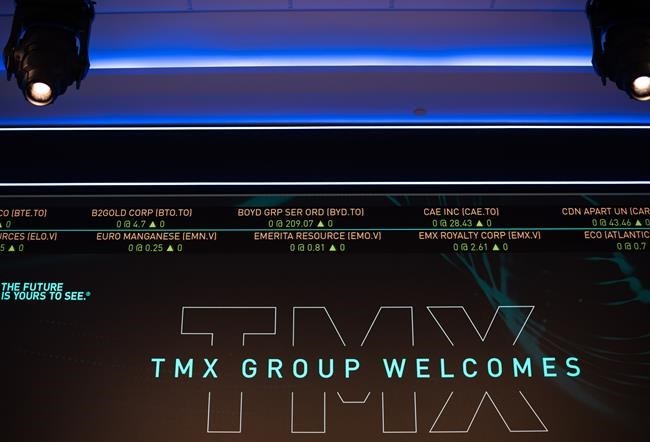TORONTO — Canada's main stock index edged lower Monday, softening as the afternoon progressed with weakness in energy stocks, while U.S. markets were mixed but didn't make big moves in either direction.
The S&P/TSX composite index was down 66.78 points at 20,514.80.
In New York, the Dow Jones industrial average was up 40.47 points at 33,431.44. The S&P 500 index was up 2.78 points at 4,048.42, while the Nasdaq composite was down 13.27 points at 11,675.74.
With no major economic news Monday, “there's just more sort of an overarching apprehension about the week,” said Lesley Marks, chief investment officer of equity at Mackenzie Investments.
That apprehension highlights just how focused investors still are on decisions by central banks — particularly the U.S. Federal Reserve — about interest rates and inflation, she said.
This Tuesday and Wednesday, Federal Reserve chairman Jerome Powell is testifying before two committees in Washington, D.C. Marks said investors will be looking to his commentary to get insight into the Fed's interest rate path, Marks said.
“And so I think that the market is going to have a hard time moving with conviction in either direction until they hear from Chairman Powell this week,” she said.
Meanwhile, the Bank of Canada is expected to announce it’s holding interest rates steady Wednesday, said Marks. Investors, already certain that rates won’t be budging this time around, are likely more interested in what Bank of Canada leader Tiff Macklem will have to say about the central bank’s latest decision than in the decision itself, she said.
On Friday, investors will get February employment data in the U.S. and in Canada, the last labour release in the U.S. before the Federal Reserve meets next. Labour, one of the major economic indicators when it comes to inflation and interest rates, has been a source of both worry and optimism, as employment hasn’t flagged in the face of rising rates.
“Labour has been the one area of the economy that has really surprised people based on its resilience,” said Marks.
The Canadian dollar traded for 73.45 cents US compared with 73.48 cents US on Friday.
The April crude contract was up 78 cents at US$80.46 per barreland the April natural gas contract was down 44 cents at US$2.57 per mmBTU.
The April gold contract was unchanged at US$1,854.60 an ounce and the May copper contract was up two cents at US$4.09 a pound.
This report by The Canadian Press was first published March 6, 2023.
Companies in this story: (TSX:GSPTSE, TSX:CADUSD=X)
Rosa Saba, The Canadian Press



